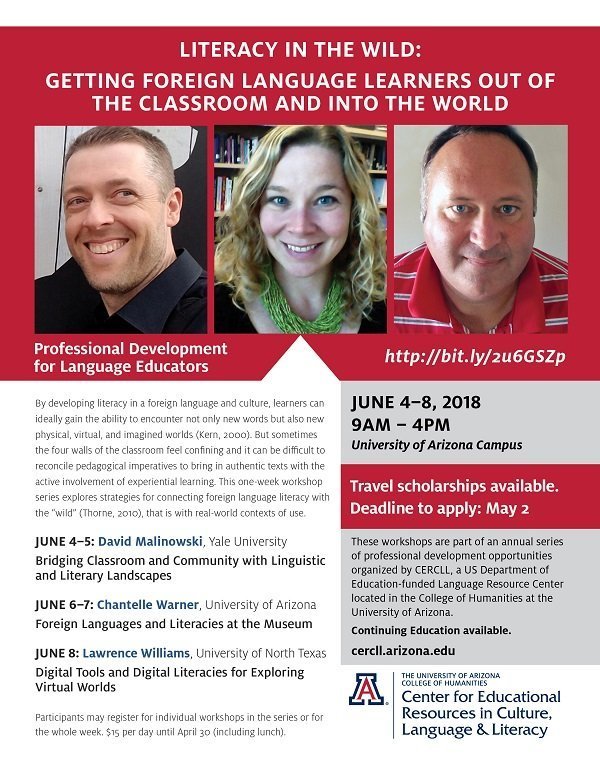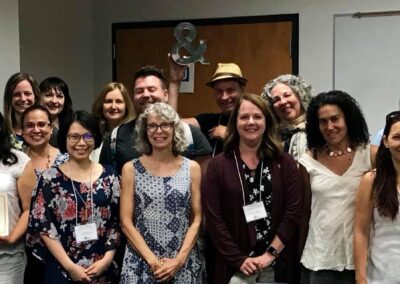Two summer series are offered in 2018– a workshop series, Literacy in the Wild: Getting Foreign Language Learners out of the Classroom and into the World (June 4-8), and a summer institute, Reading Globally: Critical Issues in Global Literature for Children and Adolescents (June 25-27). Participants can register for any combination of the workshops/institute–or for all of them–and will receive a certificate for 6 hours AZ CE per workshop day.
Literacy in the Wild: Getting Foreign Language Learners out of the Classroom and into the World, June 4-8, 2018
By developing literacy in a foreign language and culture, learners can ideally gain the ability to encounter not only new words but also new physical, virtual, and imagined worlds (Kern, 2000). But sometimes the four walls of the classroom feel confining and it can be difficult to reconcile pedagogical imperatives to bring in authentic texts with the active involvement of experiential learning. This one-week workshop series explores strategies for connecting foreign language literacy with the “wild” (Thorne, 2010), that is with real-world contexts of use. Participants may register for individual workshops by David Malinowski, Chantelle Warner and Lawrence Williams, or they may register for the whole week. Click on the toggles to read workshop abstracts.
For materials and resources from these workshops, click here.
June 4-5: David Malinowksi (Yale University), Bridging Classroom and Community with Linguistic and Literary Landscapes
As it has grown in sociolinguistics and language policy for the past 15 years, the field of Linguistic Landscape has shown significant potential for second language and literacy learning as well. Indeed, the visible and audible languages of public space—including street signs, billboards, graffiti, public service announcements, and the conversations of passersby—are far more than examples of ‘the target language in context;’ they also present unique opportunities for L2 learners to interpret and produce language in an ensemble of multimodal, embodied and ideological textual practices in place.
In this workshop, we will explore such opportunities as they relate to multiliteracies approaches for language teaching, as well as the Communities, Connections, and other ACTFL World-Readiness Standards. Participants will experiment with tools, techniques, and activities for classroom and community-based learning in the linguistic landscape, including:
• Documenting and interpreting linguistic, visual, audio, and spatial meanings together
• Conducting local walking tours, observations and interviews
• Virtual tours, telecollaboration and other strategies for approaching distant linguistic landscapes
• Translation and other literary approaches to (re)writing familiar landscapes
Throughout the workshop, participants will prototype activities and resources specifically tailored to their own classrooms, curricula, and communities.
June 6-7: Chantelle Warner (University of Arizona), Foreign Languages and Literacies at the Museum
In recent years there have been calls from across the field of foreign language teaching and learning to develop pedagogical approaches that foster students’ multiple literacies. A far cry from traditional definitions that regard literacy as the ability to read and write, contemporary discussions of literacy and language teaching treat literacy as multimodal, multimedial, and multifaceted and emphasize the social and symbolic dimensions of language use and learning. This workshop looks at the art museum as a site for developing learners’ capacity to read and reflect on how images and texts make meaning, how they relate to one another, and how they tell the story of particular cultural heritages and traditions.
Participants will…
• discuss key concepts related to literacy and language teaching and reflect on how they relate to their own teaching contexts;
• be introduced to sample museum-based activities for the FL classroom;
• have an opportunity to put themselves in the role of learner as they engage in one of the sample activities at the University of Arizona Art Museum;
• develop or adapt activities for their own classroom
June 8: Lawrence Williams (University of North Texas), Digital Tools and Digital Literacies for Exploring Virtual Worlds
This workshop provides participants with opportunities to explore digital linguistic landscapes as authentic content for learning and teaching languages. Although there are many similarities between physical and digital linguistic landscapes, there are some aspects that are quite different, and the main advantage of digital linguistic landscapes is their accessibility. In the first part of the workshop, we will use digital language artifacts from different languages (such as Arabic, Catalan, English, French, German, and Spanish) in order to study the range of artifacts that can be found on line. The second part of the workshop focuses on different approaches to analyzing and categorizing digital artifacts. The third segment of the workshop will allow participants to engage in hands-on analysis of their own digital artifacts or digital artifacts provided by the workshop leader. This part of the workshop will allow participants to have one or more lessons ready for the classroom or at least some project ideas that could be developed into lesson plans.
Reading Globally: Critical Issues in Global Literature for Children and Adolescents
June 25-27: Kathy Short (University of Arizona) with experts and authors in global literature.
We live in a world where our lives are interconnected in complex ways across global cultures as well as fractured with tensions that divide us. Global children’s literature provides one means of facilitating intercultural understanding, but issues of availability, access, authenticity, and classroom use must be addressed for this potential to be realized. In this institute, participants will explore current trends in global literature for children and adolescents, examine critical issues and approaches to analyzing these books, and experience strategies for critically engaging with global literature. Participants will use the Worlds of Words collection (http://wowlit.org) to be immersed in a wealth of global literature as well as to delve deeply into key books to develop critical understandings and to consider how to invite students into a critical reading of the word. An additional component will be interactions that pair classic, well-known texts often used in elementary and secondary classrooms with global children’s and adolescent literature to expand the curriculum and include global perspectives.
Click here for additional details.
All workshops took place on the University of Arizona campus from 9 am to 4 pm each day. Continuing Education Certificates were provided–6 hours per workshop day.
Registration Information:
The “Literacy in the Wild” series workshops were $15 per day until May 7 and $20 per day thereafter. Participants could register as an individual or for a group
Lodging Information:
Hotels within walking distance of the workshops include: Aloft Tucson University and Tucson Marriott University Park Hotel. You can also book a hotel on the streetcar route for easy access to the university (http://www.sunlinkstreetcar.com/); CERCLL has used the Riverpark Inn for previous professional development events. You might also want to try the University of Arizona dorms or Air BnB for reasonably priced lodging options.
Presenters' Biographical Statements
David Malinowski is Language Technology and Research Specialist at the Yale Center for Language Study. With a background in language and literacy education, multimodal communication, and technology-enhanced learning, he conducts research and supports pedagogical innovation on such topics as internet-mediated intercultural language learning, distance language teaching, and linguistic landscape for language and literacy education. His background in language teaching includes several years teaching English as a Foreign and Second Language in intensive academic settings, as well as elementary undergraduate Korean and Japanese. David holds an MA in English with a Concentration in TESOL from San Francisco State University, and a Ph.D. in Education from UC Berkeley. His research profile and publications are available here: https://yale.academia.edu/DavidMalinowski.
Chantelle Warner is Associate Professor of German Studies, faculty member of the interdisciplinary program in Second Language Acquisition and Teaching, and Co-Director of CERCLL at the University of Arizona, where she also directs the German Language Program. Dr. Warner teaches multiple courses related to the teaching of language and culture, including seminars on L2 literacy, literature and language pedagogy, language teaching methods, and approaches to language teaching and learning. Her research focuses on affective, experiential and aesthetic dimensions of language use and learning, foreign language literacy development, pedagogical stylistics, literary pragmatics, and critical multilingualism studies.
Lawrence Williams is Professor of French and Applied Linguistics at the University of North Texas, where he teaches undergraduate and graduate courses in French and serves as the supervisor of the department’s educator preparation program. His research focuses primarily on second language acquisition and technology-enhanced language learning/teaching.
Kathy G. Short is a professor in Language, Reading and Culture at the University of Arizona and works with educators around the world on inquiry-based global curriculum. Her research focuses on inquiry, global children’s and adolescent literature, dialogue, and intercultural understanding. She has co-authored many books, including Teaching Globally: Reading the World through Literature, Critical Content Analysis of Children’s and Young Adult Literature, Essentials of Children’s Literature, Creating Classrooms for Authors and Inquirers, and Stories Matter: The Complexity of Cultural Authenticity in Children’s Literature. She is director of Worlds of Words, an initiative to build intercultural understanding across global cultures through children’s literature, and is a past President of NCTE and USBBY.
Travel Scholarships
Scholarships of up to $400 funded language educators travelling to attend the Literacy in the Wild workshop series. These funds reimbursed eligible travel expenses up to $400, for which original receipts for charges made by the recipient were required. Reimbursements will be processed after the workshops.
Applicants were asked to provide a) identifying information, b) an estimated travel budget, c) a description of how they plan to share what they learn at the workshop series with their colleagues and implement the experience in their classroom (maximum 2000 characters), and d) which workshop(s) in the series they would attend.
Application Deadline: May 7, 2018.



